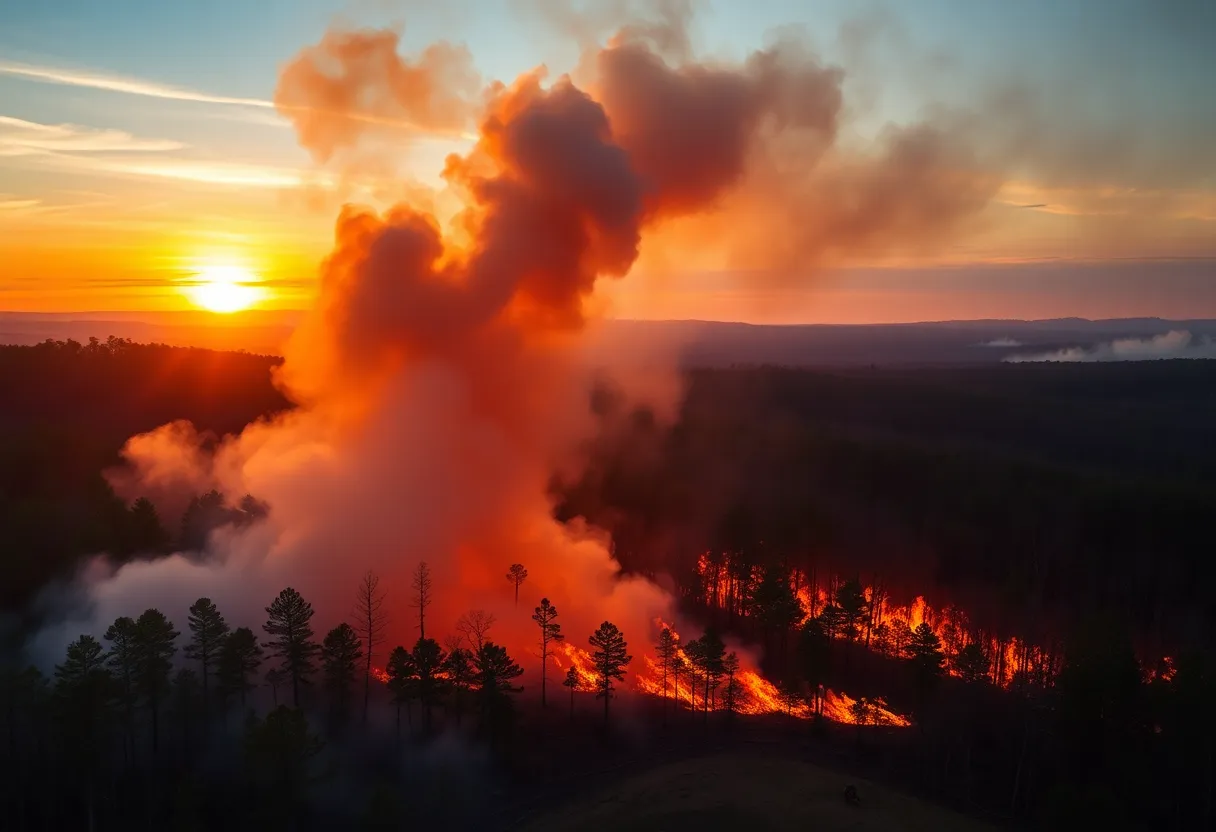News Summary
As wildfires continue to burn across North and South Carolina, officials have declared states of emergency and ordered evacuations. The largest fire is in the Carolina Forest area, forcing significant evacuations. Efforts to control the blazes are ongoing, but challenges from dry weather and changing winds complicate firefighting operations. Some areas have reported a decrease in active wildfires, demonstrating the effectiveness of containment efforts. Despite the difficulties, firefighters remain committed to quelling the flames and supporting affected communities.
Carolina Wildfires Rage On: Evacuations and Emergencies in Effect
As of March 6, 2025, both North and South Carolina are facing a challenging and tense situation as multiple wildfires burn across the states, causing evacuations and prompting significant state emergencies. Residents are on high alert while firefighters work diligently to contain these blazes.
Ground Zero: The Carolina Forest Inferno
One of the most concerning fires is in the Carolina Forest area near Myrtle Beach, South Carolina. This fire has already consumed over 2,000 acres, forcing nearby neighborhoods to evacuate as it spreads. In response to the growing danger, South Carolina’s Governor Henry McMaster has declared a state of emergency, ensuring that the necessary resources are available to combat the flames.
Efforts to Contain and Control
Firefighting efforts are in full swing, with authorities providing detailed maps of the current situation to keep the public informed. It’s worth noting that efforts are producing some positive results; as of the morning of March 6, the North Carolina Forest Service reported that while there were 81 active wildfires across North Carolina, this number has decreased significantly from over 200 earlier in the week. Each day firefighters are working hard to bring these wildfires under control, with some fires classified as contained and others as controlled—the latter being fully extinguished, while contained fires still pose a risk of spreading.
Spotlight on Polk County
In North Carolina, the largest active blaze is in Polk County, which has expanded to more than 600 acres but is currently reported to be 91% contained. This large fire is a significant focus of firefighting efforts. Moreover, in South Carolina, the ongoing situation remains dire with approximately 22 wildfires documented on Thursday, a remarkable drop from over 100 earlier this week, showing that efforts to contain these fires are making a difference.
Weather Woes and Aerial Support
This wildfire outbreak has been exacerbated by dry weather and unseasonably warm temperatures, creating the perfect storm for such disasters to occur. Unfortunately, changes in weather like high winds and heavy rains are complicating firefighting efforts. Due to these adverse conditions, aerial firefighting operations have been at times paused, complicating the battle against these challenging fires.
Despite these challenges, teams on the ground are leaving no stone unturned. They are employing both ground-based and aerial tactics, utilizing planes and Black Hawk helicopters for crucial water drops to quell the flames.
Evacuations and Caution After the Fire
As a precaution, numerous neighborhoods in the Carolina Forest have been evacuated, located roughly 10 miles from Myrtle Beach. Thankfully, it has been reported that residents who evacuated Horry County have begun returning to their homes. However, local officials urge that caution remains essential as there is a possibility of hot spots rekindling.
The Broad Picture of Fires in North Carolina
Across North Carolina, the landscape is dotted with wildfires of varying sizes. Some are less than an acre; others, like the Polk County fire, stretch beyond 600 acres. The Bee Rock Branch Fire in McDowell County has now reached 300 acres, currently at 0% containment, leading to an evacuation order for residents on Wild Acres Road. With local, state, and federal responders collaborating to monitor and strengthen containment lines, the situation is dynamic and requires ongoing attention.
While the causes of these fires remain largely undetermined, it is noted that previous incidents in these areas were linked to downed power lines during gusty conditions. As firefighters continue their valiant fight against the fires, the resilience and unity of the communities should not be underestimated as they await news of recovery and control.
Deeper Dive: News & Info About This Topic
- WYFF4: North Carolina Wildfire
- Wikipedia: Wildfire
- WXII12: Surry County Wildfire
- Google Search: North Carolina Wildfires 2025
- WCNC: McDowell County Wildfire
- Encyclopedia Britannica: Wildfire
- USA Today: Wildfires in the Carolinas
- Google News: Wildfires in South Carolina March 2025
- ABC News: South Carolina Wildfire







